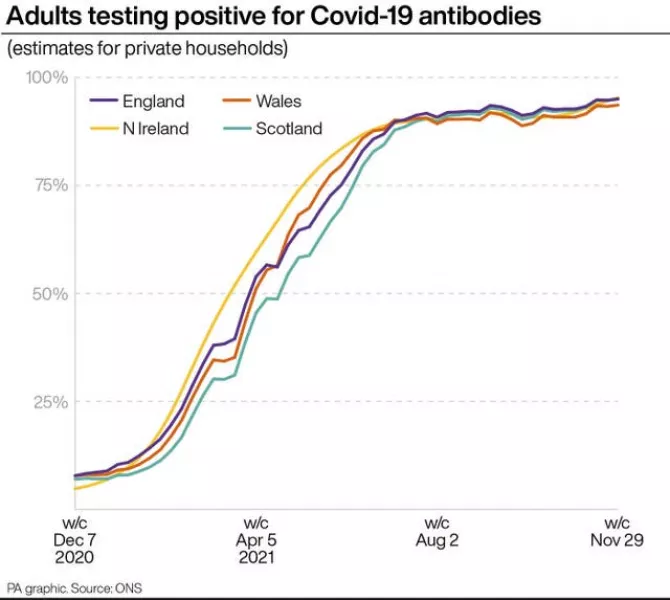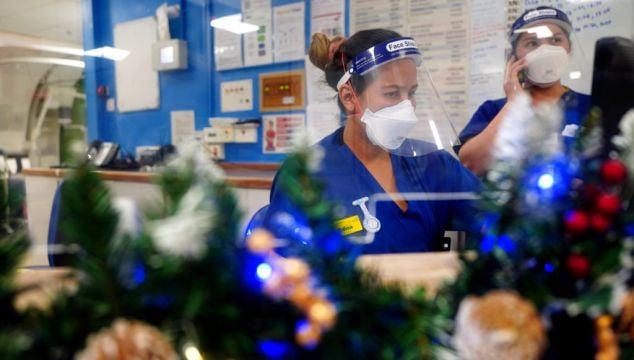AstraZeneca and Novavax said their shots protected against the Omicron coronavirus variant on Thursday, as UK infections reached a new record though data suggests Omicron may cause proportionally fewer hospital cases than Delta.
AstraZeneca said a three-course dose of its vaccine is effective against the new variant, citing data from an Oxford University lab study yet to be published in a peer-reviewed medical journal.
The study on AstraZeneca's vaccine, Vaxzevria, showed that after a three-dose course of the vaccine, neutralising levels against Omicron were broadly similar to those against the virus's Delta variant after two doses.
Antibody levels against Omicron after the booster shot were higher than antibodies in people who had been infected with and recovered naturally from Covid-19, the Anglo-Swedish drugmaker added.
The Oxford study analysed blood samples from those infected with Covid-19, those vaccinated with two doses and a booster, and those previously infected with other variants of concern. It included samples from 41 people given three doses of Vaxzevria.
Encouraging signs
Although the early data is positive for the company, AstraZeneca said on Tuesday it was working with its partner Oxford University to produce a vaccine tailored for Omicron, joining similar efforts from other vaccine-makers.
The company said researchers at Oxford University who carried out the study on its booster were independent from those who worked on the vaccine with AstraZeneca.
Hours earlier, Novavax Inc said early data showed its vaccine - recently authorised for use by the European Union - also generated an immune response against Omicron.
Similarly encouraging signs about hospitalisation rates emerged from South Africa on Wednesday, but the head of a leading African health agency joined the World Health Organisation in cautioning that it was too soon to draw broad conclusions.
"Let's be careful not to extrapolate what we are seeing in South Africa across the continent, or across the world," Africa Centres for Disease Control (CDC) chief John Nkengasong told a media briefing.
Infection levels
Coronavirus infections have soared wherever highly infectious Omicron has spread, triggering new restrictions in many countries.
First identified last month in southern Africa and Hong Kong, the variant is becoming dominant in much of Europe including Britain, where daily new infections have soared to record highs beyond 100,000.
An estimated 1.4 million people in the UK had the virus in the week ending December 16th, the highest number since comparable figures began in autumn 2020.

In France, daily coronavirus cases - currently close to 90,000 - could rise into the hundreds of thousands in January, a scientific adviser to president Emmanuel Macron said on Thursday, while Germany reported its first Omicron death.
In Italy, the first Western country to be hit by the pandemic last year, the National Health Institute said Omicron would soon predominate, while Greece banned public Christmas festivities to curb its spread. Both countries also made outdoor mask-wearing mandatory.
However, increases in hospitalisations and deaths in South Africa and Britain since Omicron took hold appear to have been only gradual.
University of Edinburgh researchers who tracked 22,205 Omicron patients said on Wednesday the number who needed to be hospitalised was 68 per cent lower than they would have expected, based on the rate in patients with Delta.
Imperial College London researchers reported evidence of a comparable 40 to 45 per cent reduction in hospitalisation risk.
'Don't over-interpret'
Raghib Ali, senior clinical research associate at the University of Cambridge, said scientists had warned that, with the surge in UK cases, even a small proportion of hospitalisations could overwhelm the healthcare system.
However, the data was encouraging and "may help justify the government's decision not to expand restrictions on social gathering over Christmas in England", he said.
The UK data supported Wednesday's findings from South Africa's National Institute for Communicable Diseases (NICD).
A separate South African government-backed study, yet to be peer-reviewed, on health workers given the Johnson & Johnson vaccine identified "clear and early de-coupling" of hospitalisation from Omicron cases compared with Delta.
However, the CDC's Mr Nkengasong said the NICD data, suggesting Omicron was 70 to 80 per cent less severe than Delta, should be interpreted "with a lot of caution".
"This is early days and public health practice is local," he said, adding that particular factors such as the young median age of the South African population could be in play.
On Wednesday, the WHO's technical lead on Covid-19, Maria van Kerkhove, said data on Omicron was still too "messy" to draw firm conclusions.







